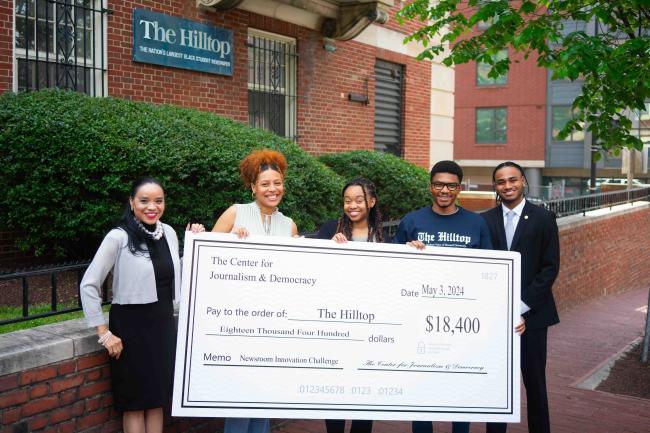By Sholnn Z. Freeman
The Center for Journalism & Democracy at Howard University will award nearly $200,000 to 10 student newsrooms at Historically Black Colleges and Universities (HBCUs) through its inaugural Newsroom Innovation Challenge. The awards are designed to improve newsroom technology, business operations, audience engagement and reporting at campus newsrooms. The unique program advances the Center’s mission to help prepare HBCU students to become investigative journalists who will hold power accountable and strengthen U.S. democracy.
“HBCU student newsrooms brim with talent, but often lack the resources needed to give students access to the cutting-edge technology and operational support that so many of their peers at predominately white institutions have,” said Center for Journalism & Democracy founder Nikole Hannah-Jones, who serves as Knight Chair in Race and Journalism at Howard University’s Cathy Hughes School of Communications.
Hannah-Jones said too often HBCU journalism students cannot volunteer for their campus news organizations because they need to work jobs that pay. “This grant program seeks to even the playing field by upgrading student newsrooms and paying stipends for student journalists,” Hannah-Jones said. “Investments in the talent and ambitions of aspiring journalists will fundamentally transform these newsrooms.”
The initial grant program was open to members of the Center for Journalism & Democracy’s nine HBCU cohort schools. Newsrooms were invited to apply for competitive funding last fall by submitting their vision and goals for strengthening their newsrooms and operations. Winners were notified in late April.
The grantees are The Hilltop and HU News Service, both of Howard University; Morgan State University, University of the District of Columbia, Morehouse College, Florida A&M University, North Carolina A&T University, North Carolina Central University, Savannah State University, and Texas Southern University.
The 10 newsrooms will receive award packages ranging from $4,000 to as much as $29,000, and include a one-time technology award. The newsrooms will also receive funding for two years to pay select newsroom staff and funding to hire contributing writers. Newsrooms can apply to renew the funding for the contributing writers for up to five years.
“We are profoundly grateful for the awarding of these funds. It will make a significant impact on our ability to bring news and information to our readers,” said Milton Kent, professor of practice and advisor to Morgan State University’s The Spokesman student outlet. “I can tell you that The Spokesman has lost talented journalists because some of our students can’t afford to work in the newsroom without being paid, so this is huge.”
Each newsroom will create a team that will include the faculty advisor, a student staff member and two other students responsible for implementing the plan. The Center will provide ongoing support through training and monthly meetings.
“The Newsroom Innovation Challenge is part of the vision I had when I founded the Center two years ago and I am so excited to finally see these resources headed to where they are much needed,” Hannah-Jones said. “When we invest in our HBUCs, we invest in ensuring our multiracial democracy is covered by a multiracial press.”
The University of the District of Columbia will use its funds to revive The Trilogy, the campus paper that has not published in a decade. “There are so many talented storytellers on campus who are ready to do great reporting,” said Trilogy editor Asha Moore-Smith, a rising senior at UDC. “This award will help us afford the tools and resources we need to create the highest quality content we can. We’re really grateful for the Newsroom Innovation Challenge award.”
Other examples of how newsrooms intend to use their funds include, installing a Whisper Room at The Hilltop for production of podcasts, purchasing high-definition cameras, and paying an editor on the investigative beat. Texas Southern University plans to use their award to launch a physical newsroom with computers and field kits for the newsroom staff, and to pay editors and contributing writers.
Pictured in the Morgan State photo: from left, Jacqueline Jones, dean, Morgan State University School of Global Journalism & Communication; Kali-Ahset Amen, executive director, Center for Journalism & Democracy; Jah’I Selassie, editor-in-chief, The Spokesman; Milton Kent professor of practice, Morgan State University and faculty advisor, The Spokesman; Lillian Stephens, managing editor, The Spokesman; DeWayne Wickham, dean emeritus and director, Center for New Media & Strategic Initiatives, Morgan State University. Photo credit: Elijah Pittman

